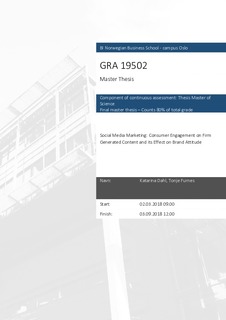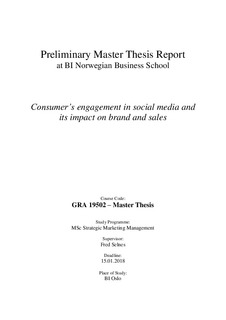| dc.description.abstract | By using Bohus as a case study, this paper seeks to add to the literature of social
media marketing by looking at different drivers of consumer engagement for firm
generated content. This particular paper addresses firm generated content on
Facebook and its effect on brand attitude. Based on a review of relevant literature,
as well as a prestudy, we have identified inherent gaps in the literature and
propose the following research question:
What drives consumer engagement in different types of firm generated content on
Facebook, and to what extent does it affect brand attitude?
Based on our research question and presented literature review, six hypotheses
regarding brand attitude and personal- and social engagement have been created.
Further, we have developed a research framework which explains the relationship
between these variables. The framework is based on the belief that the different
variables will form a certain effect on online engagement and brand attitude.
For the method of our study we use a factorial design to measure the effects of our
independent variables to be able to find inferences of causality. To test the
research framework empirically we conducted an online experiment where
respondents were randomly assigned to one of eight manipulated firm generated
content. Variables that were manipulated were inspiration (in environment vs. not
in environment), offer (20% vs. 50%) and total number of likes on firm generated
content (11k. vs. 4000k).
For the category social engagement, we found that consumers engage with firm
generated content containing inspiration by pressing like. When investigating
drivers of this engagement, social identification was found to have a positive
effect. This implicates that managers need to know their target group well enough
to create content that identify with consumers interests and personality. For the
category personal engagement, there was no positive effect for pressing link for
firm generated content containing offer. However, we found a negative correlation
for pressing like. This emphasizes the importance of inspiration within firm generated content and implies that consumers are not as interested in the offer
itself but rather the social value it brings by socially engaging.
Lastly, our study affirms a correlation between consumers brand attitude and
engagement for firm generated content, where change in brand attitude has the
biggest correlations. This indicates that managers can use firm generated content
to change consumers brand attitude, and with this increase their online
engagement. We also found that higher promotion offers in firm generated content
generates greater increase in brand attitude and number of website visits as long as
the content is found informative. Overall, our findings give insight of how to
engage with consumers, spread information and learn from and about a
company´s audience. This can help managers to better understand the effects of
marketing efforts in social media and build positive brand attitudes, further
increasing sales and profits. | nb_NO |

